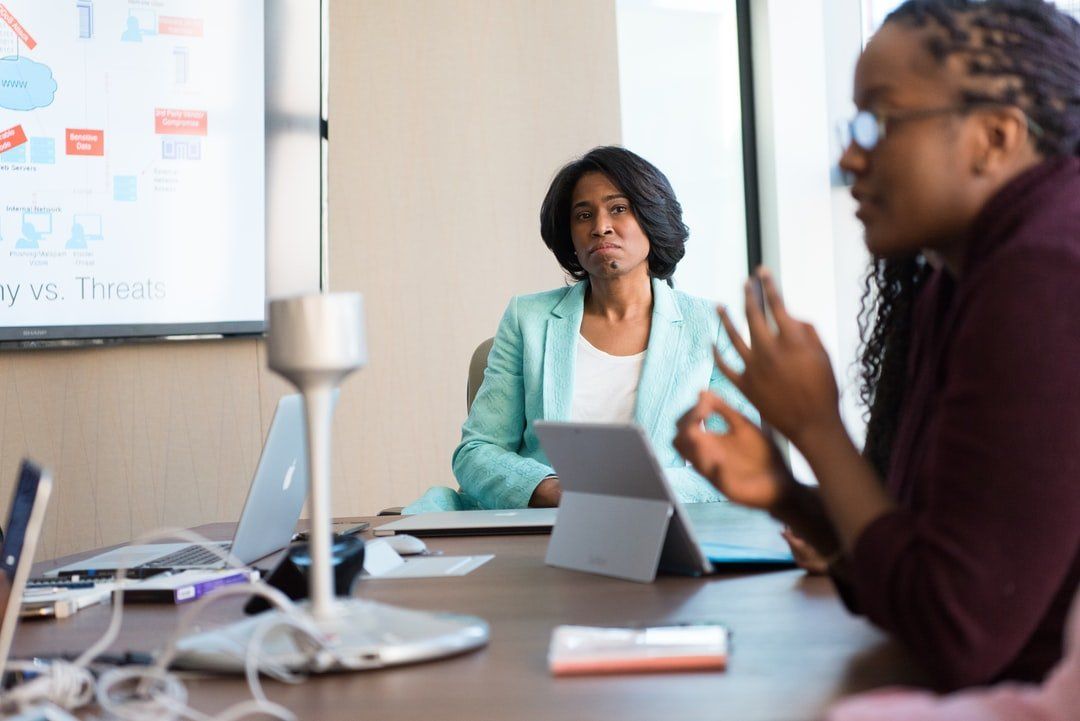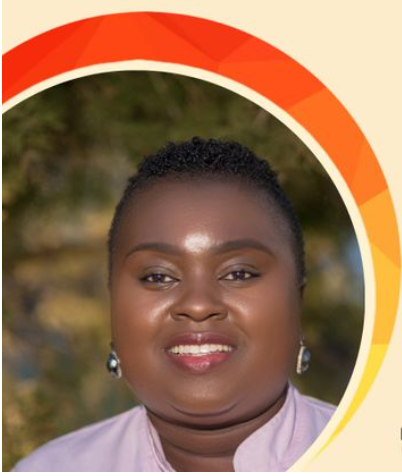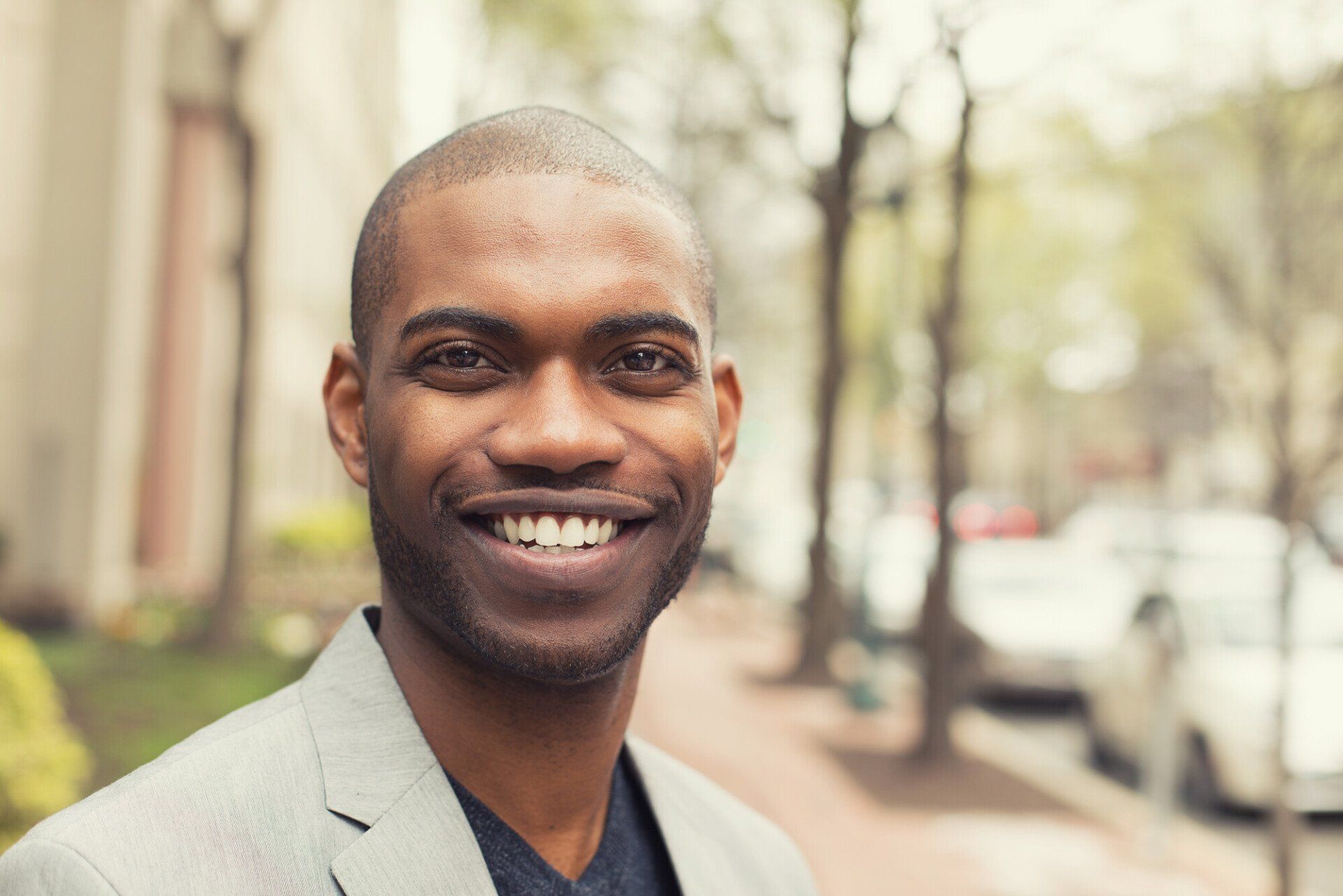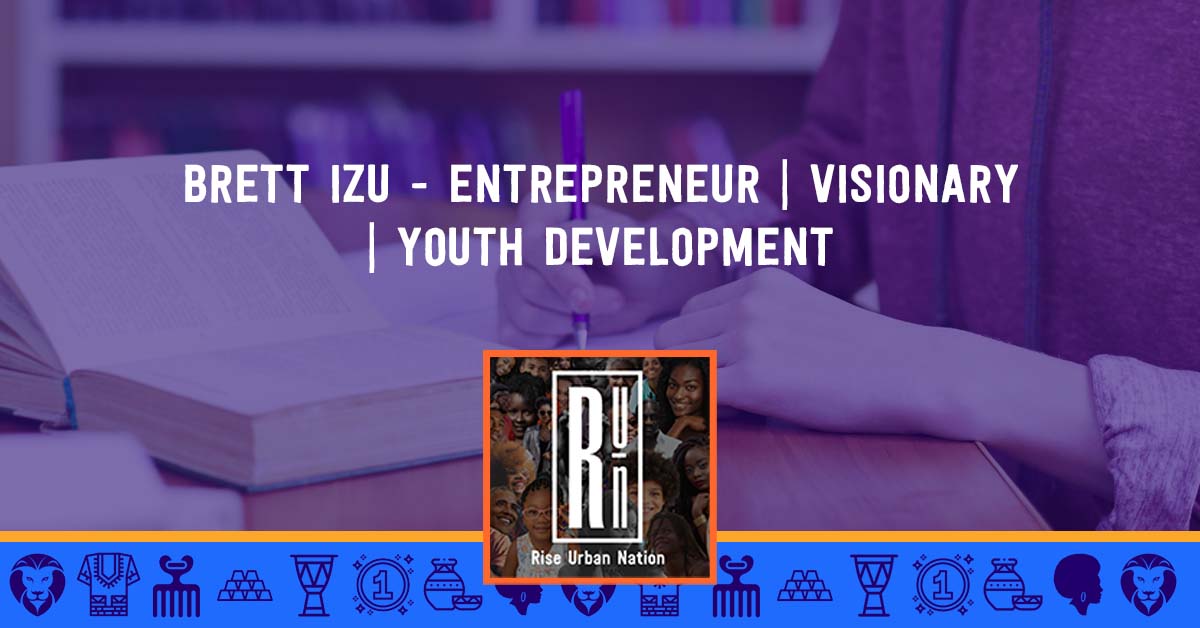Oluwatoyin Adewumi - Entrepreneur | Chef | Author | Blogger | Health Advocate
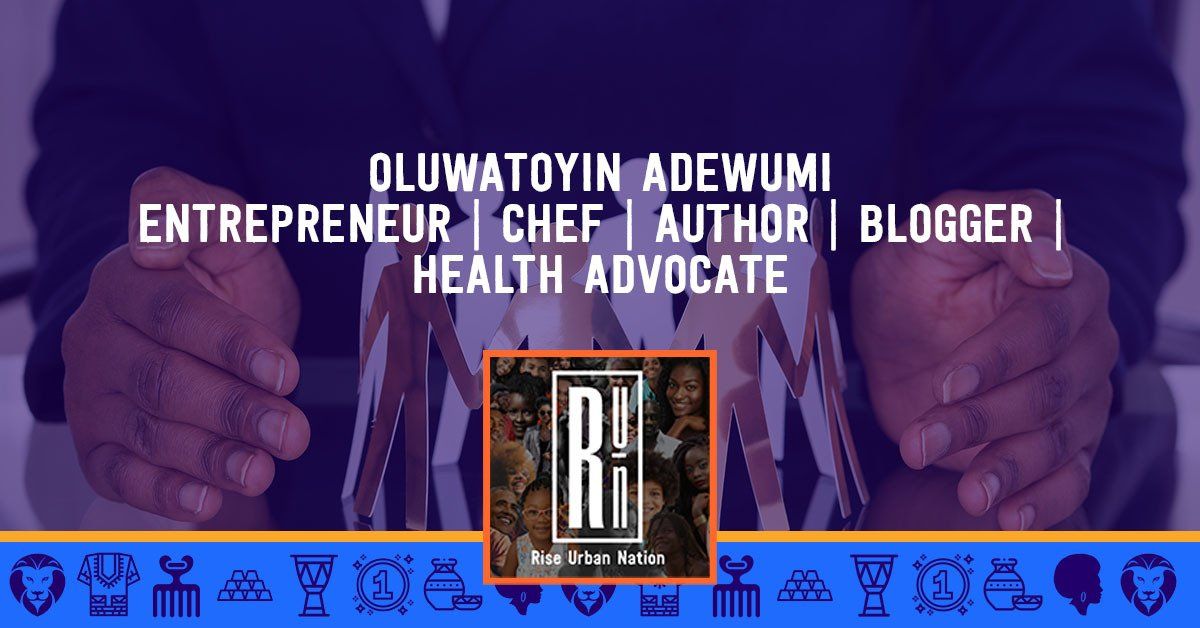
Throughout the challenges that Toyin has encountered in her life journey, she has been helped. That is why she seeks to spend her life paying it forward and helping those she is in a position to help. Oluwatoyin Adewumi is an entrepreneur and health advocate with decades of experience in hospitality, strategy, workforce development, and health IT. Toyin is the Executive Chef of TamBo's Kitchen, an African themed restaurant based on the South Shore area of Massachusetts. She is also the Executive Director of TamBo Foundation, a non-profit organization that seeks to help strip the ethno-religious conceptions that are pervasive in African communities. Join in and listen to Toyin’s powerful story that is filed with so many different testaments about faith, friendship, health, affliction and love.
Toyin’s Blog:
TamBo’s Kitchen:
We are currently surveying our listeners (or viewers) to learn more about you. Please take a few minutes and visit our website and click on the 'Listener Survey' link found on the home page. Thank you."
http://survey.podtrac.com/start-survey.aspx?pubid=ON_VODqpc104&ver=short
---
Listen to the podcast here:
Oluwatoyin Adewumi - Entrepreneur | Chef | Author | Blogger | Health Advocate
This next young lady I’m about to interview and speak to in this episode that you're about to read is truly an inspiration. First, let me tell you a little bit about Toyin. She started a restaurant called TamBo’s Kitchen. It’s an African-themed restaurant based on the South Shore of Massachusetts. As always, she will introduce me to her.
I didn’t even know there were any West Africans or Nigerians in Massachusetts, to begin with. Apparently, we are out there too but if you are ever in that area, stop by the kitchen, it’s a wonderful place to dine in and eat at. I believe they're still doing take-out during this COVID-19 period. Support your Black-local businesses over there in Massachusetts if you're out there.
Toyin was inspirational to me, not because of her entrepreneurship journey but mostly her life journey. In 2017, it was a turning point in her life because she was not only actualizing one of her dreams of building this restaurant. On the other hand, she was also diagnosed with stage three, triple-positive breast cancer. That's a mouthful.
What do you do when you're in that position? If you're in the middle of building your lifelong dream of a restaurant and you have breast cancer that you have to attempt to, what do you do? You got all your life savings in debt into this baby of reality and you feel like death is staring in your face. Did you question it? Would you give up? T decides to move on and continue to go through the journey. Her story is one filled with so many different testaments about faith, friendship, health, affliction and love. I enjoyed hearing her story and having a conversation with her offline as well. Without further ado, I give you Toyin, ladies and gentlemen.
---
I got a special guest in the building of the day. I want you to meet this lovely person that I've been introduced to, Toyin.
How are you?
I'm doing good. First, let's go into how did we meet? Let's tell the readers how we met.
We meet to assist a friend of mine. I called her sister-friend and she's also an entrepreneur. I'd love to hang around people who inspire, are goal-driven, who will push you, who want to bring the best out of you and also appreciate the best being brought out of themselves. It’s Adesola.
How did you and Sola meet, just out of curiosity?
We've met on a private social network. It was on Love Nation. It was a social media network. There was an opportunity for people to come out. She has this section called a Friday Business Promo. People get on there and you advertise yourself and sell yourself what you do. I saw her profile that she was into VC and helping entrepreneurs take their business from either concept to reality or whatever stage of the business chain you are.

She's set up to help with that. That was like, “How was that for me?” I did have some projects that I had worked on in the past that I had been looking to pick up but for lack of funds, I had not been able to get it off the ground or the technical support services that I needed. That was where my first foray into entrepreneurship. I was looking for ways to present our culture to our children, especially here in the Diaspora, in ways that can compete with the Nickelodeons and Disney. High-quality type but from the Afrocentric perspective because I looked around and I didn't see much. I had dabbled and I had a little episode series that I still have in the pilot stage.
I met with Sola and the rest is history. Now we're working together to see how we can kick it off of the ground because she is interested in the media space. I'm interested in the media space, especially media that is Afrocentric targeted towards our people, anyone who's willing and would like to learn about the continent, culture and its people.
That’s how me and Sola connected too and this podcast started to form because, like you, I grew up here in the US in Washington, DC but my stepdad is Nigerian so I grew up in the Nigerian culture. As I started to grow, when I got into workforce development and HR and so forth, what I found, especially within the Black and African communities that there is a disconnect. There's also a disconnect in how we see each other, how we see ourselves and how we could compete in the marketplace. Some of us don't even see ourselves as entrepreneurs. Every African I know got some hustling in them.
Ask any African, especially Nigerians. They probably grew up in a household where somebody had a side hustle. For me, I came from a family of entrepreneurs. When I look at the generation before my dad, my grandparents, they were the bootstrap hustle type, not even hustle but entrepreneurs with having to do with payroll and people.
My mom's dad, my grandfather blooded memory, migrated to Northern Nigeria and started a bakery in the North. Apparently, it was a very successful one. If you were able to build a twelve-room, Victorian-style apartment in your own town, you're good. He was a baker. My grandmother ran a bistro, they migrated to the South and he still continued his bakery. After a while, he stopped and became a rice miller. Those who harvested in the area will come and have a process because he was one of the few people that had the machines in the area. That was on my mom's side.
On my dad's side, his dad was a cocoa farmer. He had a cocoa beans plantation and my grandmother was a palm oil merchant. That's all they did. Now for my family, my dad was a businessman growing up. He had his own engineering company. He had worked in corporate nature for a while but after a while, I remember him saying to me one day that when he went for his interview, I believe at SCA Motors. He asked them, “What's it going to take for me to get up the corporate ladder?”
This was what the French man told him. He said, “Look around here. We're all French.” That was enough for my dad to say, “If I can rise, I better strike of this my own.” He struggled early. He built his own engineering business and focused on supplying Earthmoving equipment to state and local governments. He provided technical assistance in that space. Entrepreneurship has always been around.
That's why I named this RISEpreneurs because I think the rise for African and the Black community is through entrepreneurship taking those skills and talents. We have some of the most creative problem-solvers out there. If we use those skills to get the right knowledge in front of us and the right connections, I think we could build and create anything we want, including generational wealth for ourselves. A lot of people may know you do a TamBo’s Kitchen and some of the other things you do with your philanthropy but before we get into that, who is Toyin? How would you describe yourself to the people?
I'm an open book. Pretty much what you see is what you get. I wake up every day and my goal is whoever life brings your way to help, just help. Pay it forward because you've been helped yourself. That's been my modus operandi. I remember when I migrated to the US in 2000 to come to college, I was blessed to have a sister and we are still friends until now.
She came to pick me out from the airport because I was late. I didn't start orientation with all the other international students but she came to Logan to pick me up to make sure that I was settled. My story has been a story of someone helped in life's journey. I believe that to whom much is given, much more is required. That's me. I love to help people and put a smile on people's faces as much as I can. I love challenges. I don't shy away from challenges. I think that's why the tapestry of my life is what it is. It comes, you deal with it, you keep it moving and I love music.
Whoever life brings your way to help, just help. Pay it forward because you've been helped yourself.
What's the music that you like?
I’m into everything. Anything that has rhythm and makes me calm, I'll do it, from a normal African genre like Juju. I listen to King Sunny Ade and His African Beats.
That's the legend right there. For those who don't know, get introduced to Nigerian music King Sunny Ade Adegeye. He's a legend.
A little bit of alacrity when you want to get into the zone, I could go on that side and a little bit of jazz. I love classical music and some hymns. My parents were Episcopalian because my dad was a quiet boy so we always had the King's college album, blaring and every morning or Saturday and Sunday in the house. Somehow it was going to filter down and when I need to be in my quiet space and meditate, I put that on.
Let’s talk a little bit about your entrepreneurship journey. Out of curiosity, where do you go to school for?
The plan according to Nigerian parents sometimes they'd like to dictate what you want to be. It’s either doctor, a lawyer, engineer or an accountant and then everything else is a disappointment. My dad foresaw it. I don't know-how. He’s like, “The technology is going to be ruling everything in the future. You should want to do Computer Science.” It wasn't something that I wanted to do but daddy said so I went to Smith College and had my first degree in Computer Science. Am I using it now? No.
The Liberal Arts education opens your mind and helps you to think critically. I love the skillset that I was able to do a lot from that. As I mentioned earlier, after I had my son, I was looking for tools to help showcase African arts and culture to my children using digital arts, digital media and technology. I didn't see much so I thought, “Let's go grab a Master's in Educational Media and Technology.” I went to Harvard and I got my degree. I’m MED with a Concentration in Technology, Innovation and Education.
This is the transition right here, Technology Degree and now you're in a whole different space.
That's where life comes in. It's like, “Life gives you lemons. You make lemonade.” Prior to that, while I was at Harvard, I had been creating little things here and there that I posted on my YouTube channel and I needed the funds. I didn't get them. I didn't know where to look. I was a non-resident alien, so it wasn't like I could go to a bank and say, “This is my idea.” There were no rich uncles or unties right there that could do a lot of money and say, “Here is the venture fund for your startup.” I looked downward and thought, “What can I do? What can be my cash cow that I can use to fund this?” Because I cook, I began to do it little by little on the side and this was supposed to be something small.
I remember the first time I started, the first year, I made $100 but by the third year, people started to know who I was. I began to cater from the comfort of my home and I will use the money to take care of things. After I graduated from Harvard, I had a setback in my immigration papers so I couldn't work. I was out of status for a little while. How do you go search for a job if no one has been hiring you? I turned to cater and posting.
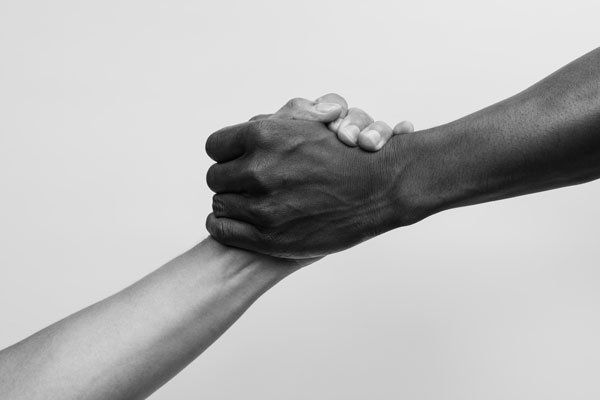
In the process, I had employees. I grew the business and by the time my husband was able to regularize my status so he had become a citizen and I became a green cardholder. I had built enough of a custom base, goodwill and everything that I needed that I moved the business out of the home. I thought, “Why not?” I looked around. I’m living in Brockton, which is at the sanctuary of Massachusetts.
There were a couple of African restaurants in the greater Boston area. You had the Senegalese, Pio Pio Peruvian restaurants and a Nigeria restaurant. I thought, “I'm not going to go crowd. Let's come to the South Shore. There are quite a number of Africans and people who might be interested in shaking their pallets a little bit and not focusing on Italian and Chinese. Let's see how we can present our food to them.” We did.
In March of 2017, TamBo’s Kitchen opened and we've been there since. The first curve was immigration overcome that hurdle and the same day that I was going to get my occupancy permit, my OB-GYN called me and said, “I'm sorry to tell you that you've been diagnosed with stage three breast cancer.” Now, I'm alive. Several years later, cancer-free.
The business is still here despite the pandemic. We haven't shut down yet. My hope and prayer are that we will not shut down because 2020 was going to be the year are where when you plan and you think this is what you're going to do. This is how you're going to do your strategy. It felt like life came with another unknown curveball again.
This time around, I sat back took a breather and said to myself, “This feels familiar. This feels like another little curveball. What did I do then that made me survive from 2017? Can I still use those two sets to wade the storm of the COVID pandemic while we wait for our government to come up with solutions and ensure that we all continue to stay afloat? That's pretty much what I've been doing.
There are so many different layers in that story to unpack. I love it because it shows your ability to pivot and get creative with how you had to overcome all those different things. I hope that our readers take a key to that. Sometimes as entrepreneurs, you get these problems that are presented to you, you get stuck and you have to try to find a way. What would you say were the biggest things or the things that you would tell entrepreneurs that helped you overcome to get through or survive the storm?
The first thing I would tell any entrepreneur is never to be afraid to ask and receive help. It's one thing to ask for help. It's another thing to receive the help that is given to you. Never be afraid to ask for and receive help.
That's a big thing in our community too.
The shame factor. I need to share this story. It was at the restaurant and one of my line cook is younger and he was trying to do something. I knew he could not do it by himself and he was struggling. He was trying to carry almost 50 pounds of cooked beef that was hot all by himself. I'm sitting there and I'm looking. I have to tell him, “Why aren't you asking someone to help you?” He struggled for fifteen minutes on how to ensure that the broth did not spill and all kinds of stuff.
I'm like, “What are your reasons why?” “I don't want anybody to call me stupid.” That, for me, was deep because I wonder how many people walk around in our community thinking and asking for help means you're stupid, weak and not capable. We need to get past that mentality that asking for help is a sign of weakness.
You need to advocate for yourself.
One of the ways that I chose to ask for help was never to walk alone. At the height of my active treatment, I brought partners into the business. I call them my sisters but they have profits with an equity stake in the business and we're all working on it together. I could take a step back and seek help when I needed it.
It was also good for me because now I don't have to be at the restaurant all the time and be there 24/7 because also I need to be easy on myself and my health. I have to look for other ways within the business structure, look for ways that I can add value, be closer to the money because I'm probably better off being the strategy to think they're looking for businesses and opportunities while they handle the operation.
It's been a blessing in a way hindsight because now I don't have to feel that I have to be there for the business to ran. It ran with or without me regardless. that was a huge lesson that I learned in the process. Never be afraid to ask for help and also, it is not for you as a business owner to say, “I'll take help from here but I won't take help from here. I don't want to be rejected so I don't want to go for help.” Help can come from anywhere through anyone at any time.
You have to be open and willing to receive it.
Now we were in 2020, the hospitality business has taken such a very big and terrible hit but we're still here and we hope to still be here. It took me to submit myself. I'm a member of a Network Delivery Truck Academy through Tiffany Aliche. When the stimulus package was on Vail, she had a one-hour tutorial. She said, ”Everybody come up here. You need to listen. This is how the funds are going to be distributed.” I could have chosen not to listen. It was helpful.
I sat down with my notes and wrote an ad at the application. When would the applications come out? What are the things that I need to do so I can get the funds to make sure that my employees still have a job, get paid, we're all alive and well? Asking and receiving for help is critical through networks whether your own circle of influence or even wider professional networks. That is very key.
The other thing too is there are some things that you cannot control. Whatever you cannot control, surrender, let it go and have the courage to let it go. Whatever you can, do what you can and let it go. Last but not least, you've got to be living something with an answer, at least for me. I pray. Every day I practice gratitude and I appreciate that for how far because I, unfortunately, know other entrepreneurs who we all started together, who are businesses have gone under or people who've lost their lives in the journey.
It doesn't mean I'm any special or anything extra about me. I have to take time off to appreciate God that I'm still here, that the business is still here and that the business is still thriving. One of the ways that I also express gratitude is through the foundation, helping to raise awareness and trying to help lift the veil and unveil or the stigmas, especially the ethnic or religious stigmas in our community about the different forms of cancer that affect us, like breast, prostate, ovarian or lung cancer, just for people to know that early detection saves lives. Go ahead and go get your checkup. There's nothing wrong with going to see your PCP and whatever happens, take it one day at a time. Fight, there is hope and therapies. Do it the right way and your survival rates will be greater.
What's the name of your foundation?
It's called TamBo Foundation.

Make sure you guys, one, to go check out the foundation and two, if you're in the Massachusetts area, support TamBo’s Kitchen. Let's keep the money growing, flowing and support your small businesses in the area. I'm glad you brought this to my attention because I believe health is wealth. Once the health goes, everything goes. That's something we need to do a better job in our Black and African community.
I was on the video web conference and they talked about how Black women and health care, how the relationship in Western medicine and how it's not a very healthy one. They're often not listened to and don't know how to advocate for themselves. I can only imagine that you might have went through some of this during your diagnosis. What did you learn along the way? What are some other things that you're doing to educate women and help women? From your experience, what are some lessons you learned? How we can move forward?
I'm glad that you touched on the whole advocacy thing because you rightly said, “The stats don't speak too well when it comes to patient-doctor relationships, especially with African-American women. They look at you and they think you're more likely to tolerate more pain. If you went to the doctor and you said you were in pain, they might be quick to give your other non-Black counterparts narcotics but give you Tylenol.
Look at Serena. She had to advocate for herself. Otherwise, she would have lost her life or tried to have a child. It cuts across classes within the community. It doesn't matter if you're a millionaire or you're below the poverty level. I always tell women whenever someone is brought to me for encouragement, when we're advocating that or they've been diagnosed with breast cancer, one of the things that I tell them is, “You need to advocate for yourself.”
2016 was the year when I began to feel symptoms. I was asymptomatic. You couldn't tell. No doctor would think it's breast cancer. I knew something was off in my body. I was having terrible heartburns that wouldn't go away after all the Tums and whatnot, it wouldn't go. I went to go see my PCP, who had been my PCP for many years. He kept saying, “It was okay. You're fine.” He did the blood work. He found out that my thyroid was a little bit over-reactive.
What I did not like was the way he handled my concern. I would call, ask for information and I wasn't getting the information that I needed. It almost seemed I was becoming a bother. At that point, I walked away from the relationship. People, if your doctor doesn't serve you, there is nothing wrong with going somewhere else. You're not joined to the hip.
I switched doctors immediately and found a brother. The first time I saw him, I said, “I fired my fifteen-year PCP. I would not be hesitant to fire you if you do not advocate for me or listen to me.” He just smiled. He said, “It's okay. I'm here to hear what you have to say. What's up?” He tried to calm me down but they couldn't find anything.
Here's the funny thing, I had gone to my OB-GYN five months earlier to the diagnosis, the same OB-GYN and gone through my yearly physical, the pap smears and breast exams. Another thing, women, please learn how your breasts feel. Don't leave it in the hand of your OB-GYN because that was the mistake I made. She said I was okay. October 2016, I was okay. Valentine's Day 2017, stage three breast cancer, metastatic to the lymph nodes. How do you correlate that? All she could say was, “I'm so sorry.”
I'm like, “Are you kidding me?” I was here several months ago but now I look back and look at those. I smile and I'm saying, “Thank you, Lord. I'm still here and the business is still here.” For that, all I can say is I'm grateful to God and I hope my story encourages people not to give up. It might not be a health scare but the thing about entrepreneurship is anything can happen at any time.
I listened to this podcast, How I Built This. One of the things about entrepreneurship is that it will test you. It will test your resilience, resolve, how desperately you want the business to grow and if you're ready to give up or not. You have to say to yourself, “I'm in this for the long haul.” It might look like the ground is about to fall off from under you, which will happen sometimes because it is what it is. Cashflow issues, payroll issues, you never know what's going to come slamming you.
Entrepreneurship is not a sprint. It's not even a marathon. It's a long, patient walk. It's a faith walk. You have to be willing to take that step-by-step because, in the process, you will also get to know yourself ad why you’re doing what you’re doing.
The key thing that you said there is resilience. That's been the theme of your life, resilience and a lot of prayers.
There's this denomination in Nigeria, the CAC. They constantly say, “Pray so you do not become prey.” You go to fill yourself up because when the days of adversity come, you need something to hang on to and that has pretty much been my life's journey and I'm grateful for where I am now. I'm hopeful for what 2021 will bring. That this too shall pass. We will put that behind us and we can start building again and building it fresh.
One thing that I like about your story that inspires me too because I know you do a little bit of workforce development as well or you've done some. When I had done workforce development in my community, I often saw different people of color. They have this limiting belief of what success looks like for them. It's mostly based on, “Whatever my parents told me or what I see in media. My parents said the only way I'm going to be successful is as I become a doctor, lawyer and engineer. I have to go to school for this. That's the only way I'm going to be successful,” or they see, “I'm going to be either a rapper, basketball player, football player or something of this nature. That's the only way I'm going to be able to be successful.”
One of the reasons why I started this show is because I wanted people to see different versions of what success could look like for them and write their own version of success. Now, one thing I used to ask people that I used to interview and I'm going to ask of you. What was your first job? What did you learn from that first job that you took with you as a learning lesson and helps you be successful in who you are now?
Back home in Nigeria, my mom had a little mini-mart. Is chocolate jobs considered first jobs? I’m sitting there and helping her. I’m learning customer service, helping to run the register, those sorts of things that I did but also my dad, once in a while, would wake us up. He wanted me to be in Corporate America but he would wake me up very early in the morning to help him go through his proposals and RFPs to check for errors.
That work ethic I took it with me when I came to the US, getting up, hitting the ground, running and doing what you need to do, learning to plan for the day. Those are skills that were important at a very young age. When I came to the US, I worked in my house kitchen. I’m a freshman year at Smith College, the first year, I was helping in the kitchen. I was the kitchen staff.
My work started at 12:00. I had to be there by 11:50, make sure everything was set and ready for lunchtime and the kitchen was clean. Those skills of being reliable, being on time, smiling, nad serving are the things that I picked up and it took me all the way. I joined YMCA Training Inc. in Boston. It's a workforce development training and profit organization. I was first immigrant in the Greater Boston Area and the people who were trying to live transitional assistance and I look to find a way to get a fresh start into the corporate setting in healthcare and in the business area so we can get closer to the soft skills that they need.
In that capacity, I had the opportunity to serve a community that we’re looking for, not just a handout but the how to be successful. You take those skills with you, service, hospitality, punctuality, reliability and they go with you. They found the bedrock and that helped me when I started to cater from the comfort of my home. When a client says they want this much, want to cater, food delivered at this time will be at that time, it will be delivered at that time.
If there's anything that I'm grateful for that people say about my brand is if you tell Toyin to be somewhere at 2:00, you better not be the one waiting for you. My clientele know. We need you to be here at this time, at this place. It will happen. I'm grateful for that skillset of stuff, continue to stick and for those who continue to keep us in business.
Sometimes, as entrepreneurs or even in their career and looking at your career, they get so stuck on the bigger things like the degree and all these other things.

Those things that you think are insignificant.
That's what sets you apart from your competition and you adding value to a company organization or your manager. Let's get more into that blueprint that you were talking about of success. We talked about the soft skills and those things that you learned from your first job. Let's say I'm a young woman who's inspired now by your journey and I want to go down the same path that you've gone down, what would be three tips or three things of advice you would give to a young woman that's going down the same path? I just finished college or I'm a woman who has been in there at her dead-end job for some time now. Now, I'm inspired by hearing your journey and I know like, “This is my calling. The Lord wants me to do this.” What are three steps you would give to somebody who is in any of these positions?
I can only advise on what I know, start small. Microsoft or Amazon didn't get to where they were overnight. It's a journey. Entrepreneurship is a journey. It's not even a marathon. It's a long patient walk. It's not a sprint. I don't consider it a marathon. It's a faith walk. You have to be willing to take that step-by-step because, in the process, you will also get to know yourself, market space and why are you doing this. You get to fine-tune your product and service. I always tell people it's not money you need first. That's making sure that you are in a good place to bring your concept to life bit by bit.
Explain a little bit what do you mean by when you're talking about making sure you're going to get a space. Is it mentally, financially or spiritually? What do you mean?
You're in the space physically, mentally, spiritually. For example, you want to start this product. Maybe you've seen somebody do it. Don't go into business because other people are doing it, do it because you see a need and you want to fulfill it. That brings me to my second one. You don't do a business because other people are doing it. You're doing it to fulfill the need.
I remember the catering was supposed to be a cash cow towards getting my media business off the ground but for the longest time, I had issues with two things, no disrespect to foodpreneurs that I'd gone ahead of me. There was a foodpreneur who wanted to cater for my wedding and the way that she came off was condescending, left so much to be desired.
For me, I wanted to get into the service because I wanted people to know that you can have a wonderful experience while trying African food. It can be done professionally and presented in a way that you would love to come back again. When the chips are down, when the whole world is going hullabaloo, you go back to why? Why did I do this? Why am I in this? There will be days when you don't want to wake up, don't want to do it and be tired.
When you remember that the reason why I got into this business in the first place is because I want to fulfill a need, I see a gap and I want to make needs then it will be worth sustaining and the money will come. That's my number two. Number one, you start small. Number two, know why you want to do it in the first place because entrepreneurship is not for the faint of heart. It is not for everybody.
I always tell people there's a difference between a side hustle and a business. A side hustle is just you. You're having fun. When it's a business, I'm talking about you got employees and you need to deal with payroll. They don't care that you didn't make sales. They need their paycheck. You need to pay rent, do with your insurance and handle all that. Now you got a business so you rent it.
Those things would test your resource so you have to ask yourself, “Why am I doing this?” Lastly, don't walk alone. The Bible says two are better than one. I see all the businesses that are profitable and even businesses that are Fortune 500. If you read the stories of the faces of the company, you will find out that they didn't stop the concept. They might have been the ones who incubated the concept but they brought people to help them in the process. Never walk alone as a business. Even if you have an idea, share it with someone, not for somebody that shares that vision with you and works through it together.
If you're not nourishing yourself as an entrepreneur, you can't nurture your business. Nourish yourself mentally and physically. Take time to rest, step back and then you can give your all to your business.
Those are all great words of wisdom. Make sure you read those words of wisdom. I don't even know where we should go from here to wrap up. You gave us all such great gems and jewels. Where can people connect with you whether it be TamBo’s Kitchen or your foundation?
I look forward to people coming over to come to get some food. That will be nice. People who are like-minded and would love to support us, one of the things that we're trying to do on the foundational side right now is patient education. We’re using African languages. We're trying to create little educational materials that we can disseminate in African languages and also share with foundations on the continent who are doing something similar.
We're trying to collaborate and not compete. We provide them for free to those foundations to use as part of their tools and their skillsets. If you would like to support us, that will be a great opportunity right there. To help with funding or to help us see how we can bring this out to more people, we need volunteers and languages to help with that.
If you have the will and your able to volunteer, support in whatever way you can, I want to end off with your quote because I love it. I want to know what it means to you. You gave me your favorite quote. It’s, “Life is too short to be stressed.”
It was during my dark days where my battle with breast cancer because cancer will make you rethink life in a whole different way and hold a whole different meaning. For me, I live every day with gratitude and not stressing myself out about everything. Whatever I can do, I can do. Whatever I can’t do, I just can't do it rather than walking about fully worked up over nothing. Life is too short to be stressed. We can't do this. Let's keep it moving.
Some people stress themselves out to death and that's where your health deteriorates. As an entrepreneur, if you are overly stressed about things that you can control or even if you can't control it, it leaves you in a different mindset and skillset. You have to connect and create with people.
Finally, please make room to take care of yourself. As an entrepreneur itself, care is key because it's so easy to get all worked into the business. It's like a baby for all of us. You're trying to nurture it and all that. If you're not nourishing yourself as an entrepreneur, you can't nurture your business. Nourish yourself mentally and physically. Take time to rest, step back and then you can give your all to your business.
Toyin, it has been a pleasure to have you on this show. I know we could talk and go forever.
Thank you for having me.
Thank you for coming. I look forward to the day when I go out to Boston and have some of that great food that you got out there. If you were in the Massachusetts area south Shore of Massachusetts, check it out. Get you a to-go plate. Until next time. Thank you for joining us.
Important Links:
About Oluwatoyin Adewumi
Toyin is an entrepreneur and health advocate with decades of experience in hospitality, strategy, workforce development, and health IT. She is the Executive Chef of TamBo's Kitchen, an African themed restaurant based on the South Shore area of Massachusetts. She is also the Executive Director of TamBo Foundation, a non-profit organization that seeks to help strip the ethno-religious conceptions that are pervasive in African communities. A mother of 2, Toyin loves to travel, read, and help anyone looking to jumpstart an idea. She also blogs about her life experiences.

